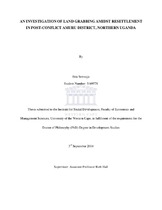| dc.description.abstract | This dissertation investigates the processes which underpin land grabbing, the diverse land grab types, actors involved and their roles in facilitating the expropriation of community land. It also interrogates the agrarian transformations and socio-economic consequences and the mechanisms employed by the local communities in Amuru district of Northern Uganda to block and resist the expropriation of their land. To achieve these objectives, this study employed a qualitative research design and methodology. The techniques that were used to collect the data are review of secondary data, individual in-depth interviews and focus group discussions. The study revealed that liberalisation of the Ugandan economy reduced the role of the state and subsequently promoted market approaches to land and agrarian reform. Market-led approaches have facilitated the commoditisation and entry of private investment in land and agriculture in Uganda. The dissertation identifies two distinct categories of land grabs in Amuru district. The first category comprises of two cases. One, large-scale land grabbing for commercial agriculture by the Madhvani Group in Lakang village; and two, large-scale land grabbing for conservation purposes by Lake Albert Safaris Limited in Apaa village. The second category encompasses localised small-scale land grabs between and among local communities of Amuru district. I further disaggregated the localised small-scale land grabs into four broad categories which are ‘inter and intra-community’ as well as ‘inter and intra-family’ land grabs, with the former encompassing the broader members of the community, while the latter involves members of related families. The actors who are directly and indirectly involved in land grabbing are domestic and foreign investors, the Ugandan state, Uganda Wildlife Authority, local governments, military personnel, the politically connected and rich peasants in Amuru district. Whereas land grabbing in Amuru district has resulted in the accumulation of more land, power and capital for domestic and foreign investors as well as local elites, loss of agrarian livelihood systems, rights to land, cultural heritage, identity, spirituality and belonging, incarceration and loss of lives as well as destruction of property have, in turn, disempowered and marginalised the local communities. A wide range of response mechanisms, including open display of nudity by elderly women, seeking legal redress from statutory courts and traditional authorities, questioning the procedure of land acquisition, acceptance and rejection of widow inheritance have been deployed by the local communities to block and resist the expropriation of their land. | en_US |

